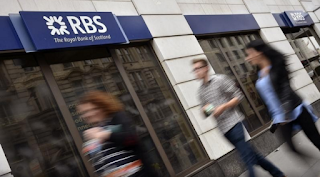 |
| UK banks set for grim results showing size of turnaround task |
By Lawrence White and Andrew MacAskill
LONDON (Reuters) - Britain's top banks are set for one of their worst first-quarter earnings seasons since the financial crisis, adding to their struggle to win over investors against a backdrop of misconduct charges, a weak economic outlook and uncertainty over Brexit.
Despite shoring up their capital bases and paying out strong dividends, the five biggest banks - HSBC, Barclays, Standard Chartered, Lloyds Banking Group and Royal Bank of Scotland - have collectively seen their shares fall about 11 percent this year against a 1.5 percent rise in the FTSE 100.
The costs of laying off staff, compensating customers missold loan payment protection insurance and stockpiling cash to settle outstanding lawsuits and regulatory investigations are all expected to compound the hit to quarterly profits from record-low interest rates.
Most analysts expect earnings to fall at the big five banks, with Barclays, HSBC and Standard Chartered thought most likely to suffer the biggest hits because of their large investment banking operations.
The turmoil in global equities and commodities markets this year made it harder for investment banks to make money in traditional business lines such as trading and advisory. Barclays warned investors this month that its first-quarter investment banking earnings were likely to fall.
"Expectations for Q1 results are rock bottom," Bernstein analysts said of big British banks, and posed the question: "Will this be a one-off ugly set of results or is it setting up the table for a very bleak 2016?"
Standard Chartered will be the first UK lender to report results, on Tuesday, two months after announcing its first annual loss in 26 years after slashing jobs and selling unwanted businesses in a bid to cut costs.
Such restructuring exercises by other top UK banks like HSBC and Barclays have helped to control costs but left analysts uncertain as to where growth will come from given the global economic outlook and regulatory problems.
The major U.S. banks have this month set the tone for a dismal quarter, with Goldman Sachs last week joining peers in reporting plunging profits as market volatility hit its bond trading and investment banking businesses.
BREXIT
Many British banks are struggling to boost profits with interest rates at a record low.
A key measure of their earning power is the net interest margin (NIM), the difference between the interest they get from borrowers and what they pay savers, and this is generally narrower when rates are low.
Lloyds, which reports earnings on Thursday, is expected to see its first-quarter NIM contract to 2.6 percent from 2.7 percent in the same period a year earlier, according to the average of analysts' forecasts.
RBS, which reports on Friday, will also report NIM of 2.6 percent according to analysts' estimates, up slightly from the same period in 2015.
By contrast, the measure was on average 3.5 percent across the British banking sector in 2009, according to an analysis by Cass Business School published last year.
"You are going to have relatively disappointing earnings across the board," said Ian Gordon, analyst at Investec Securities in London. "I don't have a rosy-glowed view of a near-term turnaround."
Adding to investor uncertainty, this is the first set of results where the government's 8 percent surcharge on banks' profits will apply after rules changed at the start of the year, largely replacing an earlier levy based on balance sheet assets.
British bank stocks are also being depressed by political uncertainty, with some investors steering clear of the sector ahead of the June 23 vote on Britain's membership of the EU.
"Whilst UK banks are keeping relatively quiet on the EU referendum debate in their annual reports, uncertainty over the outcome is weighing heavily on them," said Tim Howarth, banking partner at KPMG.












0 comments:
Post a Comment